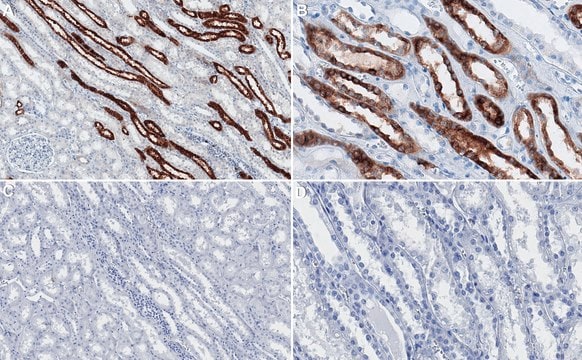AG733
Tamm-Horsfall Glycoprotein
Synonym(s):
THP, UMOD, Uromodulin
Sign Into View Organizational & Contract Pricing
All Photos(1)
About This Item
UNSPSC Code:
12352200
eCl@ss:
32160405
NACRES:
NA.41
Recommended Products
biological source
human
Quality Level
Assay
>95%
form
solid
manufacturer/tradename
Chemicon®
technique(s)
activity assay: suitable
NCBI accession no.
UniProt accession no.
shipped in
wet ice
Gene Information
human ... UMOD(7369)
Related Categories
General description
Research area: Immuno and CKS
Tamm-Horsfall glycoprotein (THGP) also known as uromodulin is abundantly present in mammalian urine. It is highly expressed in the thick ascending limb of the Henle′s loop in the kidney. This protein consists of three epidermal growth factor (EGF) domains and a zona pellucida-like domain. THGP is a member of the glycosylphosphatidylinositol (GPI) protein family and is attached to the cell membrane by a C-terminal GPI- anchor. The THGP gene is located on the human chromosome at 16p12.3.
Tamm-Horsfall glycoprotein (THGP) also known as uromodulin is abundantly present in mammalian urine. It is highly expressed in the thick ascending limb of the Henle′s loop in the kidney. This protein consists of three epidermal growth factor (EGF) domains and a zona pellucida-like domain. THGP is a member of the glycosylphosphatidylinositol (GPI) protein family and is attached to the cell membrane by a C-terminal GPI- anchor. The THGP gene is located on the human chromosome at 16p12.3.
Application
Tamm-Horsfall Glycoprotein has been used in luciferase activity assay of immortalized proximal tubular cells and human primary proximal tubular epithelial cells. It has also been used as a standard for calibration of uromodulin in urine samples.
Biochem/physiol Actions
Tamm-Horsfall glycoprotein (THGP) may play a role in antibacterial host defense, inflammatory kidney disease, and the urogenital tract. It exhibits protective effects against kidney stone formation by reducing the calcium oxalate precipitation. Mutations in the THGP gene lead to familial juvenile hyperuricemic nephropathy (FJHN), glomerulocystic kidney disease (GCKD), and medullary cystic kidney disease type 2 (MCKD-2).Tamm-Horsfall Protein (THP) mediates the formation of mucous coat of the bladder, thereby regulating the permeability of the ascending loop of Henle. THP is known to adhere to Escherichia coli strains with type 131 and type S32 fimbriae, thereby blocking their interaction with the uroepithelium. Additionally, THP activates cells by directly signaling through Toll-like receptor 4 (TLR4). It has been demonstrated that THP stimulates the production of tumor necrosis factor-alpha (TNF-α) and tissue factor in monocytes through TLR4.
Physical form
Lyophillized from deionized water containing 0.02% sodium azide.
Storage and Stability
Store +2-8°C for up to 3 months after date of receipt.
DO NOT FREEZE.
DO NOT FREEZE.
Legal Information
CHEMICON is a registered trademark of Merck KGaA, Darmstadt, Germany
Disclaimer
Unless otherwise stated in our catalog or other company documentation accompanying the product(s), our products are intended for research use only and are not to be used for any other purpose, which includes but is not limited to, unauthorized commercial uses, in vitro diagnostic uses, ex vivo or in vivo therapeutic uses or any type of consumption or application to humans or animals.
Storage Class Code
11 - Combustible Solids
WGK
WGK 1
Flash Point(F)
Not applicable
Flash Point(C)
Not applicable
Certificates of Analysis (COA)
Search for Certificates of Analysis (COA) by entering the products Lot/Batch Number. Lot and Batch Numbers can be found on a product’s label following the words ‘Lot’ or ‘Batch’.
Already Own This Product?
Find documentation for the products that you have recently purchased in the Document Library.
Aparna Renigunta et al.
The Journal of biological chemistry, 286(3), 2224-2235 (2010-11-18)
Tamm-Horsfall glycoprotein (THGP) or Uromodulin is a membrane protein exclusively expressed along the thick ascending limb (TAL) and early distal convoluted tubule (DCT) of the nephron. Mutations in the THGP encoding gene result in Familial Juvenile Hyperuricemic Nephropathy (FJHN), Medullary
Julie A D Van et al.
Molecular & cellular proteomics : MCP, 19(3), 501-517 (2019-12-28)
Chronic hyperglycemia is known to disrupt the proteolytic milieu, initiating compensatory and maladaptive pathways in the diabetic kidney. Such changes in intrarenal proteolysis are captured by the urinary peptidome. To elucidate the early kidney response to chronic hyperglycemia, we conducted
Mi-Na Lee et al.
Annals of laboratory medicine, 33(4), 293-296 (2013-07-05)
Familial juvenile hyperuricemic nephropathy (FJHN; OMIM 162000) is an autosomal dominant disorder characterized by hyperuricemia and gouty arthritis due to reduced kidney excretion of uric acid and progressive renal failure. Gradual progressive interstitial renal disease, with basement membrane thickening and
Marcus D Säemann et al.
The Journal of clinical investigation, 115(2), 468-475 (2005-01-15)
Tamm-Horsfall glycoprotein (THP) is expressed exclusively in the kidney and constitutes the most abundant protein in mammalian urine. A critical role for THP in antibacterial host defense and inflammatory disorders of the urogenital tract has been suggested. We demonstrate that
Urinary tract infections and the mucosal immune system
Ambite Ines, et al.
Mucosal Immunology, 2039-2058 (2015)
Our team of scientists has experience in all areas of research including Life Science, Material Science, Chemical Synthesis, Chromatography, Analytical and many others.
Contact Technical Service








